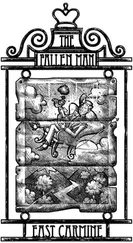The heat sources that kept Dormitoria at Low Ideal [22] Fourteen degrees Celsius.
throughout the Winter were now Uranium Reactor Piles rather than the sometimes erratic and unreliable ‘GlowPits’ of layered peat, pitchblende, coal and hardwood. By contrast, the uranium/graphite ‘HotPots’ were efficient and generally maintenance free, but could sometimes – very rarely, it was often stressed by Albion Nuclear – be temperamental in a dramatically showy kind of way.
‘I can’t go into the Winter with a potential reactor overheat and auto-shutdown on my hands,’ said the porter. ‘Who’s going to pay for the rehoming if the Beryl goes dark midwinter? Not me.’
I looked down at the floor with, I think, a sense of mild concern.
‘Fully shielded when they converted the GlowPit to a HotPot,’ said Logan, sensing my disquiet. ‘Twelve inches of lead between us and the stack. Of all the reactor-equipped Kipshops in Cardiff, none has failed any higher than a Code Orange, and that was in the Cary Grant .’
‘The control rods jammed,’ said the porter, ‘but failsafes prevailed,’ he added, with an air of disappointment.
We’d called the Duty Officer at Albion Nuclear, who initially suggested that we should wait ‘until it got really bad’ before doing something. After more urgent pressing, he concurred between yawns that someone should go down and have a look and to get back to him ‘if we thought it looked serious’.
Logan asked me to find the nearest technician on the High Octane list but the porter saved me a call.
‘We have Oliver Tiffen on the tenth floor,’ he said. ‘Nice chap. I’ll get him down.’
For emergency scrams, [23] An emergency reactor core shutdown procedure, to prevent a potentially dangerous overheat, fire and explosion.
visual inspections or other potentially fatal situations, there was a list of sprightly reactor-savvy octogenarians for whom a fatal dose of radioactivity would not radically shorten their lives. They were paid handsomely for their services and there was a medal in it somewhere if you were needed, but owing to reasonably robust safety precautions and the low wattage of the piles, most weren’t.
Mr Tiffen appeared in ten minutes, incongruously dressed in tweeds and plus-fours, and surprisingly underage – he looked barely forty-five. True, you could be any age to volunteer, but no matter what, members of the High Octane Group had to be at half-hour readiness at all times. Oliver Tiffen stared at the gauges in the control room and grimaced as the core temperature rose a few more degrees.
‘This looks like fun and games,’ he said, donning gardening gloves, a pair of goggles and a crude telephone headset. He wore a respirator around his neck in an old bag with an oxygen bottle strapped to the front, and carried a Gladstone bag full of spanners that jangled as he walked.
‘Problematical?’ asked Logan as Tiffen stared at the service log, which looked old and mildewy and was covered in coffee stains.
‘If I’m right, we’ve got under twenty minutes before an explosion rips the building apart and scatters burning fissile material for about a thousand yards in every direction.’
‘And if you’re wrong?’ asked Logan.
‘Then it’s a failure of instrumentation or my expertise,’ he said with a grin. ‘You’d all better get clear just in case. Porter? You can stand by to flood the core chamber if I can’t shut down the reactor in time.’
‘It’s that bad?’
‘It’s that bad. Here,’ he added, passing a sealed envelope [24] Not unusual; prepared last words, usually. Sometimes a will, sometimes a poem, a confession, an insult – sometimes even blank.
to Logan, ‘take this in case everything goes balls-down, would you?’
He then told the porter to stand by, opened the core access door with a key he kept around his neck, and disappeared inside. The door slammed shut and we heard his footsteps hurrying down the spiral staircase, clanging on the steel treads as he went.
‘You should both leave if you want to,’ said the porter, his hand hovering over a large pull-down handle that was marked ‘EMERGENCY CORE FLOOD’.
As a porter he had initially seemed ineffectual and flippant, but now it had come to crunch time, he would do as all porters do – never abandon their sleeping charges and go down with their Dormitorium, if required. I was learning that the Winter had a curious integrity all of its own.
‘We’ll hang around,’ said Logan, confident, I think, that between the porter and Tiffen the issue could be resolved. He didn’t ask me if I would stay, but then as his Novice, I was kind of part of him. After a few minutes we heard Oliver Tiffen’s voice over the crackly loudspeaker, and he explained the problem, which was kind of technical, but involved a loss of water in the safety tank or something, and that everything was ‘cooking up down here’. We then heard ‘oh shit’, a few more choice swear words and then, in a calm and measured tone: ‘flood flood flood’ .
The porter didn’t hesitate for an instant, and pulled the lever. There was a rumbling from somewhere deep below that sounded like rushing wet cement, then silence. The temperature gauge dropped suddenly and all the other dials slowly fell to zero.
‘Well,’ said the porter, ‘that’s me out of a job.’
The Beryl Cook had two hundred residents, and everyone still awake lent a hand to move them out. The walking awake and the dozing were sent to emergency bedrooms in other Dormitoria, but anyone in the treacly abyss of the Hib was consigned to Honeycomb Sleepshacks still in their beds, as they wouldn’t know the difference until they woke up. The mayor herself actually turned up with a retinue of large and very yawny bureaucrats, who were all eager to downplay the accident, probably because it meant returning to bed quicker and less paperwork.
‘I think we should call this a Level Three “Serious Incident”,’ she said, ‘rather than a Level Four: “An Accident with Local Consequences”. Don’t you?’
‘Didn’t the accident kill Mr Tiffen?’ asked Logan, knowing the difference.
‘Technically-speaking he wasn’t killed by the reactor – he drowned. This is really more to do with the coastguard.’
‘It was under twenty tons of boron slurry,’ Logan pointed out.
‘Agreed,’ replied the mayor. ‘They’ll dig him out in the Spring. His sacrifice will be remembered, and he will be honoured.’
And she then posed on the front steps for a lone photographer who had turned up with a disinterested-looking journalist who asked a series of lacklustre questions. It was two days before Slumberdown. No one shows much enthusiasm about anything in the last week before bedding down.
‘Come with me,’ said Logan once the mayor had departed, yawning, back to City Hall.
All Dormitoria were built to a standardised design, not refined much since initial adoption by Constantine in the fourth century. A circular building, usually capped by a steep conical roof, with twenty or more floors and a central thermal distribution shaft that ran up the centre. The stairs were either embedded in the stout and well-insulated walls, or, as here, wound their way in a spiral fashion up the central void.
Oliver Tiffen’s room was on the eighth floor and Logan used his Omnikey to gain access. The room was dimly lit, and of the standard pizza layout: a one-eighth slice of the circular floor, with the door at the truncated sharp end. The rest was divided into bathroom, bedroom and living area. Heat and light were valued commodities, but from opposite directions: heat from the central core that ran up through the building, light through triple-glazed slots in the outer wall.
Читать дальше












